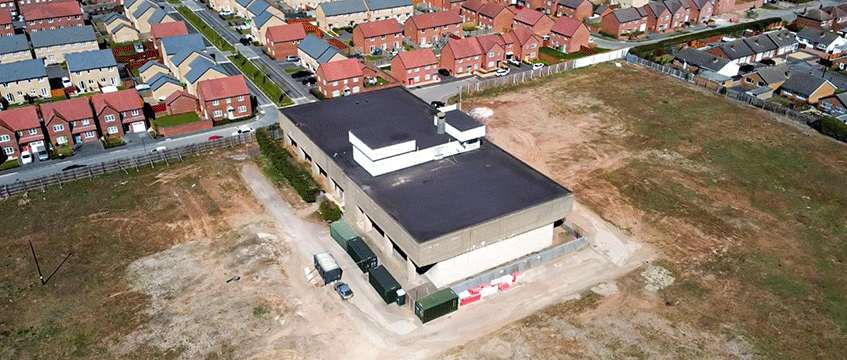Homes England is selling a windowless concrete nuclear bunker in Nottingham.
The government’s housebuilding business is inviting buyers to take on the 51,419 sq ft military bunker and surrounding land, with no guide price.
Homes England is seeking a developer to bring the site back into use and is exploring vertical farming, energy storage and film studios for the historic asset.
Known locally as “the Kremlin”, the building has also been called the “Nottingham War Rooms” and was designated as the regional seat of government for “Region 3”.
The government built the property in 1952 as a Cold War bunker with a reinforced concrete structure in the event of a nuclear attack. It was then expanded in a second phase in 1963 and made a regional seat of government with capacity for staff and autonomy from central government in a post-strike scenario.
The Grade II listed property comprises two main buildings with a series of interlinking rooms and corridors, including a BBC control room and pneumatic tubing to pass messages through the building, as well as a 50-bed dormitory and large basement kitchen.
Over the decades the property has remained in government ownership and largely been used for storage. It was transferred from HM Registry to Homes England in 2017 to prepare the site and bring it back to use.
Homes England has worked with Nottingham City Council and Historic England to survey and de-risk the property. This includes cataloguing and emptying the property, preserving historical artefacts and conducting initial site remediation, including asbestos removal.
The agency has instructed Thomas Lister to sell the property, with the option for an occupier to take just the bunker, or the wider 7.5-acre site including 5.2-acres of developable land with capacity for 324 homes.
The site is located 2.5 miles from Nottingham city centre and 4.5 miles from the M1 and neighbouring housing schemes from Bellway and Ashberry Homes.
Marika Lawrence, associate director at Thomas Lister, said: “While repurposing a Grade II listed building brings with it some challenges, soft market testing has demonstrated there will be many uses that this historic building can lend itself to.”
There were 13 regional seats of government and four in London. Following the collapse of the Soviet Union the bunkers were closed and sold. The Warren Row War Room in Reading, Berkshire, has been used as secure storage for the nearby university, the Crowborough site is used by Sussex Police to store evidence and others have been used as museums or demolished due to asbestos contamination.
However, Home England and Thomas Lister are hopeful that more creative uses in Nottingham will take advantage of the structure and history, providing space for expanding sectors such as film, logistics and data centres. Lawrence has already received interest from potential occupiers with options including a controlled underground environment for vertical farming, a TV or film studio or immersive leisure experience or escape room.
“Inevitably the Covid-19 pandemic stalled the progress of the decontamination exercise and our ability to bring the property to market,” added Lawrence. “However, the change in the way world markets operate has clearly brought with it new opportunities for development and occupying the buildings.”
To send feedback, e-mail emma.rosser@egi.co.uk or tweet @EmmaARosser or @estatesgazette











